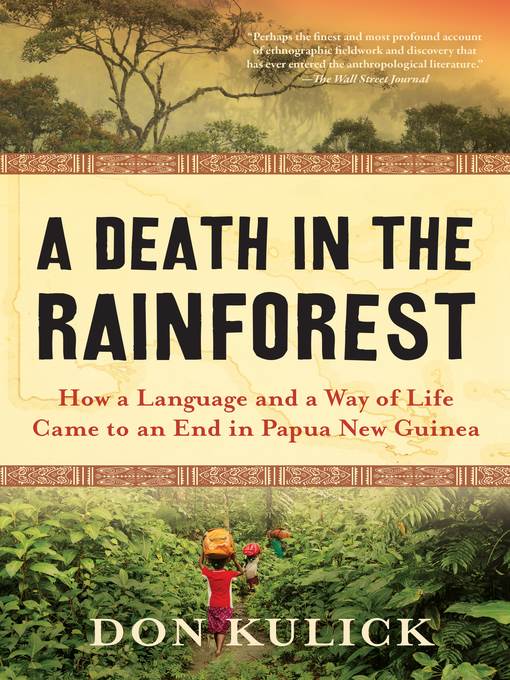
A Death in the Rainforest
How a Language and a Way of Life Came to an End in Papua New Guinea
کتاب های مرتبط
- اطلاعات
- نقد و بررسی
- دیدگاه کاربران
نقد و بررسی

April 29, 2019
Anthropologist Kulick tells a story of cultural and linguistic transformation and exchange in this clever, empathetic memoir of his time spent in Gapun, a remote village in Papua New Guinea, trying to preserve the Tayap language and to learn why it was disappearing. The book captures the spirit and rhythm of daily life in the village; most chapters explore a single event, theme, or aspect of life in the village. Standouts include: Gapunian attitudes towards children and language learning; the courtship custom of writing love letters; and deeply visceral discussions of local cuisine (heavy on the insect protein). Kulick also delves into villagers’ beliefs about the world beyond their impoverished swamp, pointedly reminding the reader that Papua New Guinea’s “cargo cults” (religious beliefs focused on attaining material wealth) have arisen as a result of profound global inequality. The decline of Tayap, too, he finds, is a symptom of cultural change wrought by economic forces.
Despite lots of fascinating detail about a culture that appears very different from the modern West, the book concludes with a firm and moving reminder about shared similarities and an exhortation to better honor collective responsibilities. This frank, passionate work will move readers interested in a thoughtful contemplation of culture and globalization. Agent: Doug Stewart, Sterling Lloyd Literistic.

May 1, 2019
How a culture withers and its language is rendered mute. Kulick (Anthropology/Uppsala Univ.; Travesti: Sex, Gender, and Culture Among Brazilian Transgendered Prostitutes, 1998, etc.) wears his scholar's hat casually in this deeply personal, engaging inquiry into a "tiny windless slit in the rainforest [of Papua New Guinea]...surrounded on all sides by massive trees rooted in a vast, seemingly boundless swamp." A small village of roughly 100 people, Gapun has its own unique language, Tayap. The author renders his academic research in a light, almost novelistic style, with plenty of drama and heartache. He invokes anthropologist Margaret Mead's conviction that we should "learn from difference." From 1985 to 2014, Kulick lived in the village seven times, once for 15 months. The villagers called him Saraki and thought him a dead person, a white ghost, a "harbinger of the change they want so badly." He immersed himself in their lives and culture and learned their unique language, later writing a grammar. The linguistic part of the book may be a bit much for some, but Kulick does a fine job describing the language's origins, how he learned it, and how it differs from the country's national language, Tok Pisin. The author discusses their cuisine, especially their main staple, sago, a raw form of flour, maggot stew, and chewed betel leaves; how they educate and raise their children, never hitting them; their sex practices; and creative swearing, which is mostly done by women. Kulick also recounts a harrowing episode when gunmen from outside tried to rob him and a villager was killed. He understands that they want to change, but he wonders, at what cost? Few now speak their precious and irreplaceable language: The "mighty tree that once was Tayap has been whittled down to a skinny toothpick." A sad and uplifting, ultimately poignant exploration of a tiny world within a bigger, harsher, and crushing world.
COPYRIGHT(2019) Kirkus Reviews, ALL RIGHTS RESERVED.

June 1, 2019
How does a language die? Some anthropologists theorize that a language may fall out of style with a population or become forgotten over time. Kulick (anthropology, Uppsala Univ., Sweden) suggests that the reasons for language death are both much more complex and simpler to understand. Over the course of three decades, Kulick visited the Papua New Guinea village of Gapun and studied their fading Tayap language. Kulick strives to display his research by telling the villagers' story in a way that shows their humanity and explaining the impact foreign forces throughout history have had on Tayap. His stories of adjusting to daily life in the village are both humorous and compassionate. Throughout his time working in Gapun, he is distinctly aware of the field of anthropology's conflicting eras of practice, from its colonialist past up to the highly culturally sensitive present. Kulick allows his research to reveal his own cultural bias and acknowledge his privilege; in doing so, he details the reasons that support his theory as to why languages die in a manner that shows strong social responsibility and fairness. VERDICT Recommended for a readership of varying ages, from young adults with an interest in cultural anthropology to college students and academics.--Monique Martinez, Univ. of North Georgia Lib., Dahlonega
Copyright 2019 Library Journal, LLC Used with permission.

May 15, 2019
During the past 30 years, Kulick, professor of anthropology at Sweden's Uppsala University, has lived intermittently in Gapun, a small, remote village in Papua New Guinea. Shifting between big themes and small vignettes, he immerses the reader in the life of the village and its history. He explains the decline of the Tayap language, never spoken by more than a few hundred and now eschewed by village youth, and recounts the challenge of learning Tayap from Raya, a cantankerous old villager who complains about Kulick's cooking. Expanding his viewpoint, Kulick explains the unique meaning of language in Papua New Guinea, the most language-rich country in the world, where its most spoken language today, Tok Pisin, emerged from the exploitation of colonialism. In this captivating narrative, the author considers complex questions about race and power in anthropological research, the nature of relationships among very different people, and the challenges of living in such a demanding environment. Kulick's engrossing, thought-provoking, and transporting chronicle will be enjoyed by National Geographic fans and all readers interested in cultural investigations.(Reprinted with permission of Booklist, copyright 2019, American Library Association.)

























دیدگاه کاربران